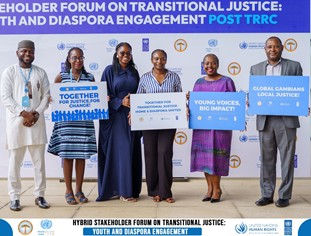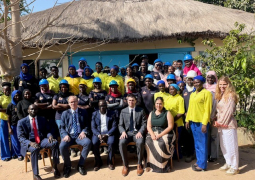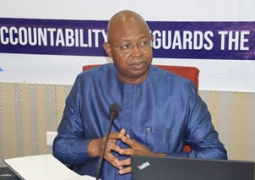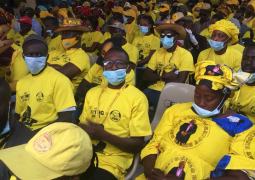
Held at the Sir Dawda Kairaba Jawara International Conference Center in Bijilo, the forum brought together over 100 young people from across the country and members of the Gambian diaspora, both virtually and physically, to strengthen inclusive dialogue and chart a way forward for lasting peace and national reconciliation.
The event was made possible through the generous support of the United Nations Development Programme (UNDP) in The Gambia, the Office of the United Nations High Commissioner for Human Rights (OHCHR), and the United Nations Peacebuilding Fund. Its goal is to amplify the voices of youth and diaspora communities groups that have historically been underrepresented in national discourse ensuring they are not only included but also enabled to play a pivotal role in shaping the country’s democratic future.
In her opening remarks, UNDP Resident Representative Mandisa Mashologu underscored the critical importance of diaspora involvement in national development. She highlighted how many Gambians abroad have returned to actively participate in transitional justice, economic recovery, and peacebuilding efforts.
Mashologu stresses that transitional justice is not a fixed destination but a continuous journey that demands vigilance, community engagement, and shared accountability. She called on all stakeholders to take forward the recommendations emerging from the forum and integrate them into national policy frameworks.
“We must think beyond Banjul,” she says. “We need to translate these recommendations into real, visible change in communities across the country. This means financing our goals and involving the 77 per cent of the population made up of youth to move this nation forward.”
Her message resonated deeply with participants, as many acknowledged that while The Gambia has made commendable progress since the TRRC concluded its work, meaningful implementation of its recommendations remains an urgent national priority.
Speaking on behalf of WILL, Ya Lena B. Houma extended heartfelt gratitude to the UNDP, the UN Peace-building Fund, and OHCHR for their continued support in translating TRRC recommendations into concrete actions. She emphasized that this support has enabled civil society actors to pursue justice, reparations, reconciliation, and gender-sensitive reforms throughout the country.
Houma also commended the Ministry of Justice and the National Human Rights Commission (NHRC) for their steadfast efforts in upholding accountability and advancing transitional justice initiatives.
“To the vibrant youth present here and the engaged diaspora joining us online, your aspirations and insights are the building blocks of our future,” Houma stated. “Let us ensure that the ideas shared in this room today do not end here, but are transformed into policies, programs, and partnerships that make a real difference.”
In a comprehensive overview of The Gambia’s transitional justice process, Dr Fatou Baldeh, founder and CEO of WILL, reflected on the country’s decision to embark on truth-seeking and accountability following the end of Yahya Jammeh’s 22-year regime. She explained that the TRRC was established in 2017 through an act of the National Assembly after nationwide consultations revealed a national desire to document and confront past human rights violations.
Dr Baldeh described transitional justice as a broad framework that includes both judicial and non-judicial processes, such as truth commissions, reparations, constitutional reforms, and anti-corruption measures. She noted that The Gambia’s approach has drawn international attention as a potential model for other post-authoritarian states.
“The TRRC was a foundational mechanism, but transitional justice also included the Janneh Commission, which focused on financial mismanagement, and the Constitutional Review Commission, which aimed at legal reforms,” she said. “These processes form part of a holistic national effort to build accountability, restore dignity, and prevent a recurrence of abuse.”
Participants at the forum expressed optimism that youth-led and diaspora-informed strategies could help shape a new chapter in The Gambia’s democratic evolution. Among the expected outcomes of the forum are increased awareness and engagement of youth and diaspora communities in justice efforts, the development of clear policy recommendations, and the strengthening of partnerships across government, civil society, and international organizations.
As the forum drew to a close, speakers urged all stakeholders to ensure that post-TRRC initiatives are not merely symbolic, but result in tangible, community-centred change. They called on the media to remain actively involved in reporting on progress, challenges, and milestones, and encouraged youth and diaspora members to take ownership of the transitional justice process through advocacy, dialogue, and civic participation.
“This forum is not just another event,” Houma said in her final remarks. “It is a turning point. It is a promise of shared responsibility, visionary leadership, and lasting impact. Let us carry forward the energy, insights and commitments shared here today and use them to build a future where no Gambian is left behind.”
With strong representation from youth, government officials, civil society, media, and international partners, the forum reaffirmed that justice, reconciliation, and sustainable peace in The Gambia must be inclusive, participatory, and future-driven. As the nation continues its post-TRRC journey, the voices of the Gambian youth and diaspora will remain central to building a just and united Gambia.




